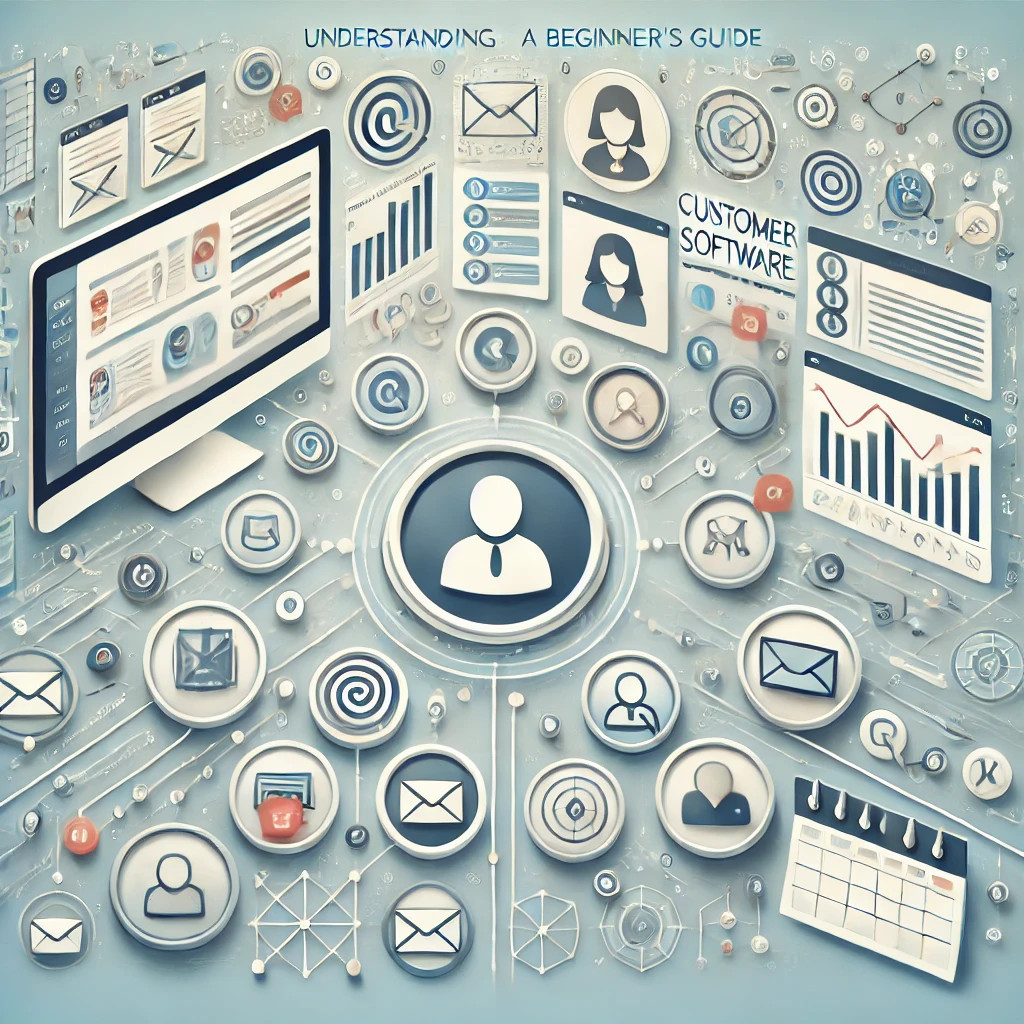Understanding CRM Software: A Beginner's Guide
Tenovan Digital 10 September 2024

Customer Relationship Management (CRM) software has become an indispensable tool for businesses looking to streamline their operations and improve their customer interactions. This comprehensive guide aims to demystify the world of CRM software, making it accessible even to those new to the concept. Throughout this guide, we will explore the fundamental aspects of CRM software, its various functionalities, and how businesses of all sizes can leverage its power to cultivate strong customer relationships and drive growth. Whether you are a small startup or an established enterprise, understanding CRM software is crucial for staying competitive in today's fast-paced business environment.
Introduction
In this Beginner's Guide, we will discuss the importance of CRM systems in modern business operations. We will explore the fundamental concepts of CRM software and why it has become an essential tool for businesses of all sizes. By understanding the basics of CRM software, readers will gain insights into how it can revolutionize customer relationship management practices and drive overall business growth. This section aims to set the stage for a comprehensive exploration of CRM software, making it accessible and engaging for beginners looking to enhance their understanding of this pivotal technology.
What is CRM Software?
CRM software is a technology tool that helps businesses manage interactions with customers and potential customers. It is designed to streamline sales, marketing, and customer service processes by providing a centralized platform for storing customer information and tracking communication history. CRM software allows businesses to manage relationships, track leads and opportunities, automate workflows, and analyze data to make informed business decisions.
There are various types of CRM software available, ranging from basic contact management systems to more advanced solutions that offer features like sales forecasting, marketing automation, and customer segmentation. Understanding the role of CRM software is crucial for businesses looking to improve customer relationships and operational efficiency.
Types of CRM Software
CRM software comes in various types to cater to different business needs. The main categories include operational, analytical, and collaborative CRM systems:
- Operational CRM focuses on streamlining customer-facing processes such as sales, marketing, and service automation.
- Analytical CRM utilizes customer data to derive insights for strategic decision-making.
- Collaborative CRM emphasizes communication and interaction with customers, facilitating better relationships.
Each type offers distinct benefits and functionality, so businesses must choose the one that aligns best with their goals and operations. Understanding these CRM software types will help businesses make informed decisions when selecting the right solution for their specific needs.
What is CRM Software Mainly Used For?
CRM software is a vital tool that helps businesses manage and improve their interactions with current and potential customers. At its core, CRM software is used to streamline various customer-related activities, allowing businesses to operate more efficiently and deliver a higher level of service.
One of the primary functions of CRM software is organizing and tracking customer data. This includes storing contact information, interaction history, preferences, and other relevant details, all in one centralized system. Having this data easily accessible helps teams keep track of where a lead or customer is in the sales pipeline, ensuring no one falls through the cracks.
CRM software is also widely used for lead management, which involves capturing, tracking, and nurturing leads as they move through the sales funnel. This makes it easier for sales teams to prioritize their efforts and focus on leads most likely to convert into paying customers.
Another major application is in personalizing marketing campaigns. CRM software can segment customers based on their behavior, purchase history, or other criteria, enabling businesses to create targeted campaigns that resonate with different customer groups. This personalization boosts the effectiveness of marketing efforts and increases the likelihood of converting leads into loyal customers.
In addition, CRM software plays a crucial role in enhancing customer service. With a comprehensive view of each customer’s history and interactions, support teams can provide faster, more personalized responses. This leads to higher customer satisfaction and helps businesses resolve issues more efficiently.
Ultimately, CRM software is designed to improve overall business performance by creating a more organized, data-driven approach to managing customer relationships. By optimizing interactions across marketing, sales, and customer service, businesses can not only increase revenue but also foster long-term loyalty and strengthen their brand.
Benefits of Using CRM Software
Using CRM software offers a multitude of benefits for businesses of all sizes. One of the key advantages is improved customer relationships. CRM systems help companies better understand their customers' needs and preferences by storing detailed information about interactions and purchase history. This leads to more personalized communication and targeted marketing strategies, ultimately enhancing customer satisfaction and loyalty.
Another significant benefit of using CRM software is increased efficiency in managing sales and marketing efforts. By centralizing customer data and automating tasks such as lead generation, follow-ups, and email campaigns, CRM software enables sales and marketing teams to work more effectively and collaboratively. This streamlined approach not only saves time but also improves productivity and results.
Moreover, CRM software provides valuable insights through data analytics. By tracking customer behavior, preferences, and engagement patterns, businesses can gain a deeper understanding of their target audience and market trends. This data-driven approach allows companies to make informed decisions, optimize strategies, and identify new opportunities for growth.
Furthermore, CRM systems facilitate better communication and collaboration within the organization. By sharing customer data and interaction history across departments, employees can work together seamlessly to provide a consistent and personalized experience to customers. This integrated approach fosters teamwork, improves internal processes, and drives overall business success.
Overall, the benefits of using CRM software extend far beyond simply organizing customer information. From enhancing customer relationships and increasing sales productivity to generating valuable insights and fostering teamwork, CRM software is a powerful tool that can transform the way businesses operate and succeed in today's competitive market.
Key Features of CRM Software
CRM software offers a plethora of features designed to streamline customer relationship management processes and enhance business efficiency. These features serve as the backbone of any CRM system, providing users with tools to effectively manage customer interactions and drive sustainable growth. Some key features of CRM software include:
- Contact Management: CRM software enables businesses to centralize customer information, including contact details, interactions, and preferences. This helps in creating personalized customer experiences and building stronger relationships.
- Sales Automation: Automation tools within CRM software streamline the sales process by automating repetitive tasks, such as lead scoring, contact tracking, and follow-ups. Sales teams can focus on high-value activities, leading to increased productivity and better sales outcomes.
- Marketing Integration: CRM systems often integrate with marketing platforms, allowing businesses to align their marketing and sales efforts seamlessly. Marketers can track campaign performance, analyze customer engagement data, and personalize marketing strategies based on customer interactions stored in the CRM.
- Reporting and Analytics: CRM software offers robust reporting and analytics capabilities, providing insights into key performance indicators, customer trends, and sales forecasts. By leveraging data analytics, businesses can make informed decisions, identify opportunities for growth, and optimize their strategies for maximum impact.
- Customer Service Tools: Many CRM systems include customer service features such as ticketing systems, helpdesk support, and knowledge management tools. These tools streamline customer support processes, improve response times, and ensure consistent and satisfactory customer service experiences.
- Mobile Access: With the increasing importance of remote work and on-the-go access, CRM software often includes mobile applications that enable users to manage customer information, track activities, and communicate with clients from anywhere, ensuring productivity and flexibility.
By leveraging these key features of CRM software, businesses can enhance customer relationships, drive sales growth, improve operational efficiency, and ultimately achieve long-term success in today's competitive business landscape.
What is the Ultimate Purpose of CRM Software?
At its core, the ultimate purpose of Customer Relationship Management (CRM) software is to strengthen and maintain customer relationships while driving overall business growth. By integrating customer data, CRM systems give businesses a powerful tool to manage interactions, improve efficiency, and optimize sales and marketing efforts.
One of the primary goals of CRM software is to build stronger customer relationships. By centralizing customer information, CRM software allows businesses to provide more personalized service, anticipate customer needs, and respond quickly to inquiries or issues. This personalized approach fosters trust and loyalty, encouraging repeat business and long-term customer retention.
Beyond relationships, CRM software is designed to boost sales and marketing performance. Through automation and detailed insights into customer behaviors and trends, CRM software helps businesses optimize their lead management, tailor marketing campaigns, and increase conversion rates. These efforts translate into increased revenue and more effective customer engagement strategies.
CRM software is also pivotal in improving customer retention rates. By staying connected with customers and addressing their needs proactively, businesses can reduce churn and build lasting relationships. With retention often being more cost-effective than acquisition, CRM software ensures that businesses maximize the value of their existing customers.
In terms of operational benefits, CRM software enhances efficiency by automating tasks such as lead follow-ups, data entry, and reporting. This allows teams to focus on higher-value activities, saving time and improving productivity across the organization.
Finally, CRM software provides critical insights for strategic decision-making. By analyzing customer data and tracking performance metrics, businesses can make informed decisions that optimize processes and identify new opportunities. This data-driven approach is essential for sustainable growth in today's competitive landscape.
Ultimately, CRM software transforms business operations by making customer relationships a top priority, optimizing internal processes, and enabling smarter decision-making. It empowers businesses to cultivate loyalty, drive revenue growth, and create a foundation for long-term success.
Conclusion
CRM software is a powerful tool that plays an essential role in modern business operations. By offering a centralized platform for managing customer interactions, streamlining sales and marketing efforts, and improving overall efficiency, CRM systems have become indispensable for businesses looking to enhance their performance.
Adopting CRM software is not just about improving technology—it’s about building stronger customer relationships, optimizing workflows, and making data-driven decisions that contribute to long-term growth. With its ability to increase productivity, boost customer satisfaction, and drive sustainable business success, CRM software has become a vital asset in today’s competitive marketplace.
By prioritizing customer relationships and utilizing CRM software to its fullest potential, businesses can unlock new opportunities for success, ensuring a strong foundation for growth and lasting impact.
